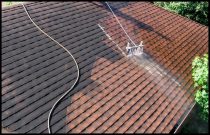While there are many different types of roof cleaners, there are several common questions that need to be addressed before making your final decision. The first question is whether the cleaner is effective and if so, how strong should it be. Roof cleaners with a high concentration are ideal for tackling common moss and stains on a roof. Then you must consider the type of roof material you have. This will determine the level of power required to clean your roof.
Roof cleaners should not use dangerous chemicals on your roof, which could void your warranty. Not only would chemicals harm your roof, but they could also damage your lawn and landscaping. And of course, chemicals can be harmful to your family, particularly pets. So, be sure to choose a cleaner that will be safe for your children and pets. You can find a roof cleaner that uses non-toxic, environmentally-friendly methods to clean your roof.
There are a number of different types of roof cleaners on the market, so it’s important to get a professional to look at your roof. He or she will recommend the type of cleaning products that are most suitable for your particular roofing issues. Generally, roof cleaners come in two types: alkaline and acidic. Alkaline cleaners break down dirt, algae, and mold, while acidic ones eliminate rust and other substances from the surface. Acidic cleaners work by removing algae, stains, and paint.
Whether to use an environmentally-friendly or chemical-based cleaner is entirely up to you. Eco-friendly cleaners are safer for the environment but may not be as effective on a particularly dirty roof. The latter are more expensive and might not be worth the effort. You should also make sure to check how much coverage the cleaner will provide, as well as whether you’ll need to repeat it. Some roof cleaners don’t require rinsing.
While bleach cleaning is the best option for some roofs, it depends on where you live and the climate where your home is located. Power washers are another option, which blasts stains with high-pressure water. Power washers are effective for metal and tile roofs, but they’re not right for all types of roofs. High-pressure water can cause damage to shingles and algae roots. Aside from these downsides, roof cleaners can damage your roof’s aesthetic appeal and cause runoff problems.
Soft wash systems are effective at removing algae, mold, moss, and mildew from a roof. The surfactants and detergents used during this process penetrate into the nooks and crevices of the roof to break up dirt and grime that can collect around the eaves. During soft pressure washing, low-pressure rinsing doesn’t strip away tiles, preventing them from becoming damaged or falling apart.
Another popular choice for roof cleaners is a solution made of biodegradable, environment-friendly selective surfactants. This cleaner works like oxygen bleach, and when diluted, produces six gallons of cleaning solution. The strength of the solution depends on the type of roof, its condition, and the porosity of its surfaces. Once the solution has done its job, rinse off the surface with water. It’s safe for EPDM rubber roofs.
